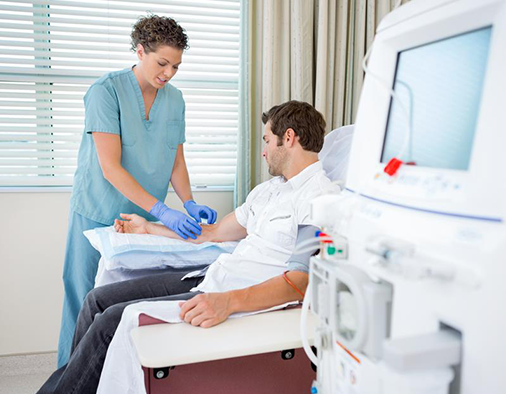Dialysis Technician
Overview
As kidney failure continues to be a growing national health problem, kidney disease is driving the growing demand for well-trained dialysis technicians. Dialysis technicians are employed in hospitals, outpatient clinics, and other medical facilities. While most technician training has historically been done “on-the-job,” today’s healthcare employers are seeking well-trained technicians who possess the necessary knowledge and skills to fill this growing number of positions.
This program provides learners the knowledge and skills needed to perform the duties required of dialysis technicians. Under the supervision of physicians and registered nurses, dialysis technicians operate kidney dialysis machines, prepare dialyzer reprocessing and delivery systems, as well as maintain and repair equipment. Furthermore, technicians work with patients during dialysis procedures and monitor and record vital signs, as well as administer local anesthetics and drugs as needed. Dialysis technicians must assess patients for any complications that occur during the procedure and be ready to take the necessary emergency measures, including administering oxygen or performing basic cardiopulmonary resuscitation. Additionally, they may also be involved in the training of patients for at-home dialysis treatment and providing the emotional support patients need for self-care.
Program Objectives
After completing this program, learners will be able to:
- Explain basic chemistry of body fluids, renal physiology, and the pathology of renal failure
- Explain the principles of hemodialysis including the dialysate, dialyzer, delivery system, and water treatment for dialysis
- Explain the safety procedures in performing the tasks assigned to the dialysis technician
- Identify specific supplies, equipment, and medications used in selected dialysis procedures
- Explain the precautions and guidelines in performing the preparation, assessment, monitoring, and care of a dialysis patient
- Define quality of care, and explain the impact of medical care on a patient when quality and safety are compromised in dialysis procedures
- Describe dialysis personnel in terms of team members and roles, treatment and intervention skills, related professional organizations, and historical leaders
Certification
Financial Aid
Grants (Military)
- MyCAA for Eligible US Military Spouses
MyCAA is a $4000 education grant for spouses of service members on active duty in paygrades E1-E5, W1-W2, O1-O2. Spouses married to members of the National Guard and Reserves in the same paygrades, in title 10 orders, are also eligible.
MyCAA covers: tuition, externship and national certification exam vouchers
Our university partners provide, as job aids, at no extra cost: books / workbooks, laptop, mentor support, 12 mos subscription to CampusEd, job placement assistance.
To see if you qualify, message us here
- Army Credentialing Assistance
The Army Credentialing Assistance (CA) program is a government-instituted training and education program that provides a grant of up to $4,000 to eligible soldiers. The grant can be used to enroll in more than 1,600 industry-recognized off-duty career-training certificate programs, licensure exams, and academic or vocational credentials, and even re-certification. It was first made available in October 1, 2019 to the Fort Hood, Fort Campbell, Fort Carson, Fort Drum, Fort Riley, and JBLM bases. As of January 1, 2020, the program is available to all installations.
To see if you qualify, email us here
Grants (Non Military)
- Workforce Grant
We have partnered with private institutions to provide assistance to qualified students. The Workforce Grant is in place to help reinvigorate the workforce amidst the ongoing pandemic. If qualified, a student may receive up to 50% of tuition assistance.
To see if you qualify, message us here
Payment Plans
- Zero Interest Monthly Payment Plans
Payment plans are available for any student at zero interest. This option is available for every university partner. Click here for a complete list.

